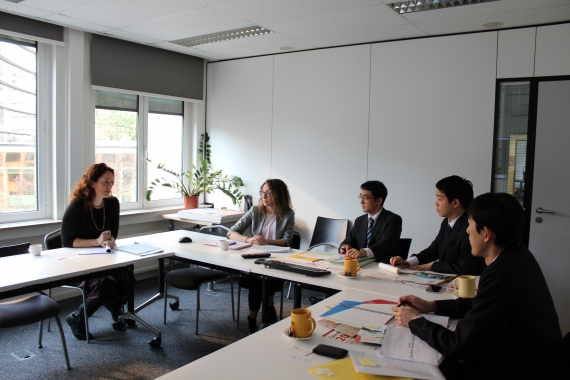Affordable housing challenges in Japan and lessons learnt from Europe
An interview with Kenji Hamamoto, Deputy Director at the Housing bureau of the Japanese Ministry for Land, Infrastructure, Transport & Tourism
Brussels, 19 March 2018 | Social, Economy
Japan seems to be in a transitional period concerning its housing market. The increasing number of vacant homes and the need for a "safety net" for vulnerable citizens are posing demanding challenges to the authorities. A delegation from the Housing Bureau at the Ministry of Land, Infrastructure, Transport and Tourism (MLIT) visited Brussels last week to draw some inspiration from the way public, cooperative and social housing providers operate in Europe. As a follow up to a very interesting meeting between the delegation and Housing Europe Secretary General and Research Coordinator, Sorcha Edwards and Alice Pittini, we interviewed Mr. Kenji Hamamoto, Deputy Director at the Housing Bureau of the Ministry to know more about the housing reality in Japan.
Interview: Michalis Goudis, Pictures: Abderrahim Khairi
Housing is considered to be in Japan “the indispensable base for citizens’ healthy and cultural lives”, as described in the Basic Act for Housing (Act No. 61 of June 8, 2006). The act also states that the government’s mission is to ensure provision, construction, improvement and management of good quality housing for citizens, now and in the future. It is also worth noting that housing is one of the main pillars of the national and regional economy: housing investment accounts for about 3% of Japan’s GDP.
How does the housing system work in the country?
Japan has a vigorous housing market. Typical choices for new families, for example, include ordering their house construction to manufacturers, purchase a pre-built house or a room of a condominium, or rent a room from a private landlord. In 2017, the construction of 965,000 new units has started.
As far as Social Housing is concerned, we have approximately 2.2 million units of Publicly-Operated Housing as of 2014. Publicly-Operated Housing is constructed and managed by local governments, with a subsidy from the national government. They account for 4% of the total housing stock in Japan.
What are the main housing challenges in Japan at the moment?
One notable challenge is the abundance of “vacant homes”, which refers to vacant or unused homes. Since a government survey in 2013 revealed that more than 8.2 million housing units stand unused across the country, the issue has been attracting nationwide attention. Among them, some 3.2 million are neither apartments listed for rental use nor secondary houses, which means they are already abandoned or could be in the near future, leading to negative impacts on neighborhoods and regions. MLIT is now working closely with local governments to encourage owners of such houses or stakeholders to either demolish abandoned homes, renovate and sell them to new residents, or convert them to commercial or community facilities.
Another recent development is the rising need to widen the housing safety-net for the vulnerable citizens. Many elderly people living on their own, or younger generation with stagnant paychecks now desperately need assistance in finding an apartment. An amendment of the law that came into force last year encourages local governments, NGOs and other relevant organizations to collaborate for providing such assistance.
What are the main housing-related policy priorities today?
In addition to working on the “vacant homes” issue and putting together the “safety net” new programs, we are trying hard to invigorate the existing, "second hand", housing market. The mainstream of Japan’s housing market still lies on newly-constructed houses. As of 2013, existing house transactions account for merely 15% of all the transactions, considerably lower than in other developed countries.
We now see the signs of change, however. Homebuyers are increasingly choosing to buy second-hand homes, especially in the case of condominiums, than before. MLIT aims to accelerate the trend by helping establish a healthy market, where the existing houses of good quality would be evaluated and recognized accordingly.
What are the key partners of the Ministry?
For social housing schemes, our closest partners are local governments, i.e. prefectures and cities/towns. We are reaching out for more collaboration to local communities and NGOs, in partnership with the Welfare and Labor Ministry of the central government, which is in charge of assistance programs for those in need.
With regards to the broader housing policy in general, we work closely with the housing industry, which includes national and regional house manufacturers, condominium developers, operators of private rental apartments and architects. Among the national government ministries, we work with the Ministry of Economy, Trade and Industry, the Ministry of Environment and the Ministry of Forest and Fisheries, to name a few.
What are your takeaways or even sources of inspiration from your visit to Europe?
We learned a lot about the housing markets and systems, especially on social housing, and the policy framework in the EU and its member States from our meeting with Housing Europe. In particular, the fact that various entities such as cooperatives and non-profit organizations provide social/affordable housing in Europe was something new to us.
Last but not least, we really enjoyed our stay in Brussels, where you have efficient public transport, lots of parks and a thriving city center. I definitely wish to visit again, maybe in summer or in autumn!
Housing Europe welcomes the Japanese delegation in Brussels
Housing Europe Secretary General and Research Coordinator, Sorcha Edwards and Alice Pittini welcome the delegation from the Japanese Housing Bureau at the Ministry of Land, Infrastructure, Transport and Tourism. The first meeting that was held on Monday, 12 March on the premises of Housing Europe has been an open exchange concerning the housing policies in Europe as well as the various schemes that are implemented in the different Member States. Housing Europe had the chance to share the views of its members and the key facts and figures from the latest 'State of Housing in the EU' report but also to learn a lot from its guests about the housing reality in Japan.
Mr. Hamamoto also received an invitation for a Japanese participation to the next edition of the International Social Housing Festival that will take place in June 2019 in Lyon, France.
Housing Europe has also accompanied the Japanese Ministry delegation to a meeting with the European Commission Directorate General for Regional Development (DG Regio), where the EU Urban Agenda Housing Partnership and the role of cohesion funds was the focus of the discussion.

Leave comments